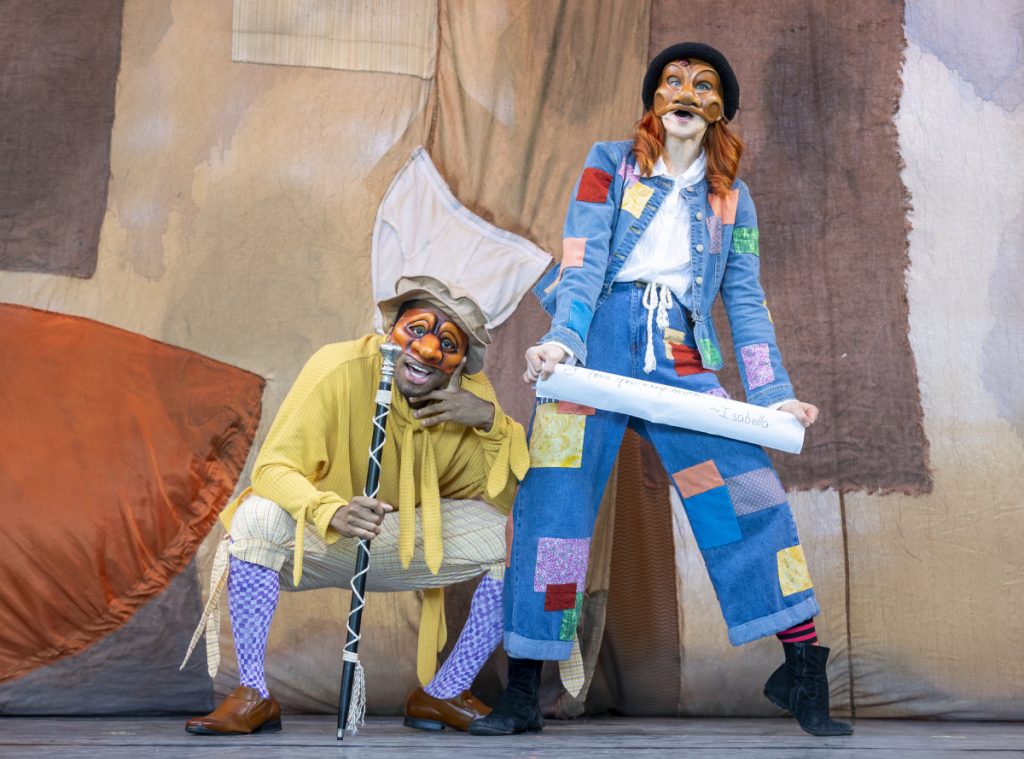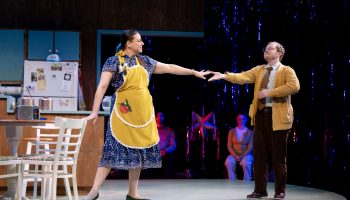DAVID KWIATKOWSKI – STAFF WRITER

Chautauqua Theater Company will have the last laugh — their self-developed show Commedia wraps up at 4 p.m. Aug. 5 in the Performance Pavilion on Pratt.
Commedia dell’arte is a form of comedy that was popular in Italy from the 16th century to the 18th century, known for its use of stock characters wearing masks and improv comedy.
Looking around Bestor Plaza this week, it could be possible that heads had to turn twice to look at the statues. The relief sculptures on the Bestor Plaza Fountain, and the statues outside Afterwords Café and the Amphitheater, were all adorned with masks, a staple of the commedia dell’arte art form.
Arts Marketing Associate Gabrielle Ghaderi came up with the idea after Arts Marketing Specialist Makayla Santiago-Froebel wanted to utilize guerrilla marketing.
Guerrilla marketing is a form of marketing that utilizes the element of surprise to promote a product — for example, McDonald’s french fries making up the yellow lines of a crosswalk.
“We were coming up with ideas of what we could put into the environment of Chautauqua to advertise the show,” Ghaderi said. “We were having some brainstorming conversations, and I really wanted to do something with the masks because I feel like that’s a very important part of this form of theater.”
Ghaderi researched the specific masks that went with each stock character, as the same characters appear in every commedia dell’arte production.
“We printed out a bunch of masks,” Ghaderi said. “I went around the grounds on my bike and measured the size of the faces and counted how many statues. Then, late at night, when it was dark, I went around on the golf cart and put these masks on statues, which involved some wading in the fountain.”
Production Stage Manager Emily Glinick is in charge of putting all the elements, both technical and creative, all together. However, this position becomes more challenging when there is not an actual script to work off of.
“My script looks like the outline of an essay; it’s (just) bullet points,” Glinick said. “There’s no text; there’s no dialogue written, because what they say is all improvised.”
In fact, the script she originally had to work with was not even a document. It was an Excel sheet that had basic descriptions of what characters were in each scene and what the main motivations were for each scene.
Glinick got the chance to study in Italy while in college and learn from commedia dell’arte masters. She jumped at the chance to take part in producing a show based on the art form.
“Back then, I was already committed to stage management, and that was a really challenging program for me because not only is commedia (dell’arte) very hard performance work, I wasn’t a performer,” Glinick said. “That was a big leap for me, but it was really rewarding because it pushed me completely out of my comfort zone and gave me a real appreciation for the actors’ process. I knew a lot about these characters going into the show — and (CTC Artistic Director Andrew) Borba and I had a couple of meetings before the rehearsal process where he picked my brain, and I picked his, about what his vision was, and what I was bringing to the table.”
Glinick believes that this ensemble of actors working together this summer have built such a camaraderie with each other that allows for Commedia to thrive.
“I think it was really wonderful that they built the trust and empathy that they did for each other by doing Blood at the Root first,” Glinick said. “That allowed them to really take risks with each other on this very challenging piece of improvisational mask theater.”
Conservatory Actor Daphne Kinard, who portrays Madame Pantalone and Tartaglia in the show, agrees, and relies on her castmates to help her if she falls.
“We know that if we say something that doesn’t land, our scene partner will save us,” Kinard said. “We know that we’re not in competition with each other. We’re all trying to lift each other up. It lets us play more games with each other and get into just a sort of letting go, because we know that we’ll be there to catch each other.”
She said she has learned so much about herself as an actor and hopes to take this newfound confidence into any future production that she is a part of.
“I think that this show just requires such an intense amount of trust in yourself and permission that I’ve never really given myself with other shows,” Kinard said. “It’s helped me gain a certain confidence that without a text there to guide me, I really have to believe that I have everything I need inside me. It’ll come out when it means to; I don’t need to plan it. Just trust that if I let go, I’m enough. I think that my challenge over the next year in school is going to be feeling like that on everything I do. Not just on improv comedy, not just on classical material, but just in general feeling like I am enough.”
While the art form is ancient, the jokes will be fresh, and possibly not suited for younger audiences — especially the final show.
“I think the final show in particular will be really fun, and possibly the wackiest yet, because once we close, there’s no repercussions,” Glinick said. “I think they’re going to feel even more comfortable to take some even bigger risks with these last few shows because they have the comfort level now, and because they’ve got nothing to lose.”




